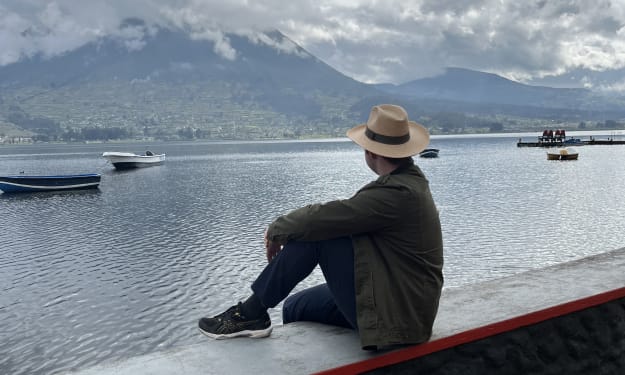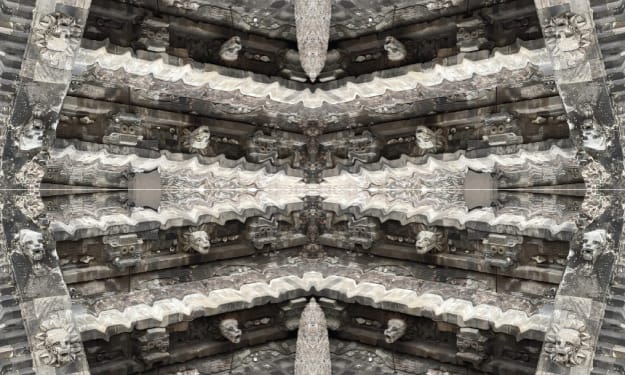Rip Current
Please, let there be no girls like her here.

The girl's bright pink visor catches Lei's eye. The rest of her—skinny legs, tank top stretched over barely-there bulges, brown ponytail—is nondescript. But unlike other tweeners thronging the sunny boardwalk, scoping out snacks and boys, this girl scrutinizes the adults streaming past as she walks against the flow of pedestrians.
From her bench overlooking the crowded walkway and the ebbing ocean tide beyond, Lei watches the girl cast glances at the passing faces. Finally, she snags the attention of a bare-chested man in a Bulls cap. The girl asks him a question that Lei cannot hear. The man gives a crooked smile, nods and reaches into his pocket. Suddenly a blonde in a peasant blouse bounces up and grabs his hand, spinning him away. The girl in the visor shrugs and presses on, scanning the next wave of faces.
Lei's feet turn cold. It is always the first sign. When she wakes from a nightmare, thrashing and kicking, her first move is to pull the blanket over her freezing toes. If a person approaches too quickly, if a place is too confining, if she glimpses a familiar hunger on a stranger's face, her feet become blocks of ice, binding her in place and sending numbing chills up her spine.
Over the last few months, Lei has taught herself to set her mind to release warming thoughts: I am free, I am safe, I am far away. She would blink, breathe, letting her new reality flow over her and slowly unfreeze her courage. She would get on with the tasks of living, keeping her mind unfettered from the icy worm coiled in the soles of her feet.
She had been born in a village by the sea—same ocean, a distant continent. Sandy-toes, the nickname her older brother had playfully tossed at her as a toddler, had stuck to her like wet sand, long after she was too old for nicknames. If she kept swallowing sea water when she swam, her father had teased, her insides would be as brined as pickled cabbage.
She had just stepped over childhood's edge when she was swept away. A family trip to a festival in the crowded city, a tidal wave of colors and smells and noise. Looking upward to trace the play of kites on the wind. Lagging behind to watch the racing boats, cheering their bright proud sails, leaning over the tidal wall for a better view, then a rough hand over her mouth, around her waist, pulling her down.
In captivity she dug her toes into her gentlest memories of home. During the worst of all the bad moments, at the apex of abuse, her mind would fly to the water's edge, circling over fishing nets, dancing with seabirds, breathing in seaweed and salt.
Her parents and brothers mourned, believing her drowned. And so she was. She was dangled like bait for anyone with a sharp appetite and a few dollars to spare. She thrashed and went limp in waters dark and salty and cold.
But tales were told. When the truth finally broke over her family, their grief turned to fierce and desperate resolve. They sold almost all they owned to buy her back. Then they borrowed to buy the ticket to send her to relatives who lived over the water. She never asked to come home—never spoke much at all—and her parents never had to say aloud why they could never take her back.
Her aunt and uncle welcomed her at the Los Angeles airport and patiently buoyed her recovery, helping her settle into a small room they had painted sandy beige. They spoke lightly with one another over meals, then let her pass silently through the evening by their side. They never questioned why she preferred the floor to her bed, wrapping herself in the heavy comforter, even in summer. They held their peace when she paced the kitchen at midnight, and let her slip out at daybreak to walk the half mile to the shore.
The pink visor bobs closer, sunlight glinting off the sequined bill. Now Lei is able to see that the girl holds a hand-lettered sign that she lifts questioningly toward passers-by. It's just a girl like me, she tries telling herself, enjoying a warm day at the beach. But the ice scales up her legs, invades her veins. Please, let there be no girls like her here. She clutches rigidly to the bench.
When Lei was drowning, winged thoughts had brought her to a place where sand met sea and danced in sunlight. Now her body has found the place of her dreams. She is here, truly here at the seaside, digging her freezing toes into warm sand. And now she has no escape.
The girl turns abruptly to move toward Lei. Startled, Lei follows the girl’s eyes to a tall man just beside her bench, beckoning. His fingers are long, his forearms sunburned beneath red-blonde hairs, his yellow Oxford shirt halfway unbuttoned. He had approached the bench from behind. Lei wants to rise, to flee, but she can only watch through frozen eyes. He reaches into his pocket, pulling out a dollar.
"Okay," he says, grinning, "Let me have one."
The visored girl approaches, stretches out her hand to take the bill. As she pockets the money, her sign flashes upward. "Jokes for Sale, $1"
The girl is so close now that Lei can see the freckles dotting her nose and cheeks, the pink heart necklace glinting on her chest. She draws a breath. "Two brothers are driving through the desert when their car breaks down. They decide they have to walk through the desert to find help. One brother gets out a canteen, sunscreen, and floppy hat. He says, “Now if I get hot, I'll be protected.' The other brother takes a screwdriver, removes the car door, and starts to take it with him. 'What the heck are you doing?' his brother asks. The guy explains, 'If I get hot, I'll just roll down the window!'"
The man rolls his eyes. "Please, tell me my money went to a good cause."
"I'm raising money for a trip with my youth group," she answers, with just a trace of defensiveness.
"I guess that's worth another dollar," says the man, fishing out a second bill. "But please—skip the joke."
The girl laughs and drifts back into the current of the crowd, her sign on display.
Lei feels herself thaw. Not gradually, but all at once, the tingling blood rushing from her feet through her heart up into her head, surging behind her eyes. She turns her face to let the tears flow in the direction of the sea.
About the Creator
Heidi Unruh
My passion is "coming alongside people and their good ideas, so great work can shine!" I do this as a developmental editor, writing coach, and author of 6 nonfiction books. Creating fiction, poetry and plays is pure joy!
Enjoyed the story? Support the Creator.
Subscribe for free to receive all their stories in your feed. You could also pledge your support or give them a one-off tip, letting them know you appreciate their work.






Comments
There are no comments for this story
Be the first to respond and start the conversation.